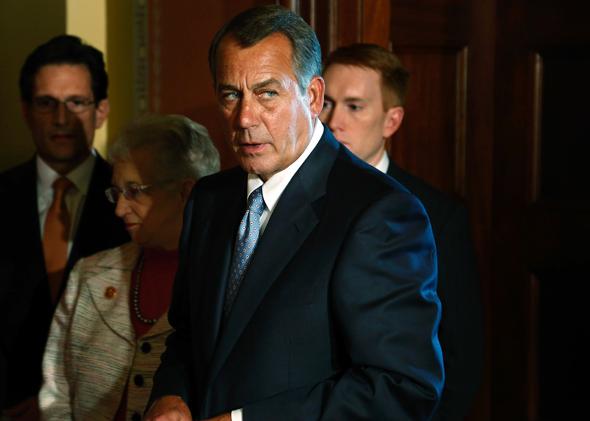Friday in Washington played out the only way it could have. The Republican effort to block funds for the Affordable Care Act died, as expected, with only 18 members of Sen. Ted Cruz’s party willing to join him on a filibuster. The Democrats’ effort to fund Obamacare united every member of their party in the Senate, even those up for re-election in red states next year. Cruz’s failure had been preordained; not even a pack of House Republicans who watched the vote from the sidelines were shocked.
After his victory, President Obama walked in front of TV cameras to shame the defeated GOP. “The House Republicans are so concerned with appeasing the Tea Party that they’ve threatened a government shutdown or worse unless I gut or repeal the Affordable Care Act,” he said. “That’s not going to happen.” He went on a roll, decrying Republicans who wanted to raise the debt limit only if Obama agreed, basically, to Mitt Romney’s economic plan.
“Imagine if you had a Republican president and a Democratic speaker,” said the president, “and the Democratic speaker said, well, we’re not going to pass the debt ceiling unless we raise corporate taxes by 40 percent or unless we pass background checks on guns or whatever other list of agenda items Democrats were interested in!”
This was Obama at his punchiest, and if you didn’t listen closely, you didn’t notice a missing word. Sequestration. The president called on Congress to fund the government and move on to raising the debt limit, but he didn’t mention that the now Obamacare-approved continuing resolution only funded the government for two months at a $986 billion spending level. That’s less than House Democrats were comfortable with, as they saw a chance to replace sequestration’s mandatory, random cuts. Republicans were able to add $19 billion in defense funds; Democrats got nothing.
The story of sequestration gives a couple of hints about the ways the GOP might still hack away at Obamacare. House Republicans, most of whom now hail from safe districts, have road-tested a number of Obamacare cuts or tweaks that Democrats once mocked then forgot about.
Start with the “41 votes to repeal Obamacare.” It’s a Democratic laugh line that lumps together every vote, procedural, unsuccessful, or successful, to change or kill the 2010 law. But it’s a bit too pat. Some of those votes, to end the late-life care CLASS Act, have made it through the Senate and into law. Some, like the repeal of Obamacare’s tax on medical devices, have been popular with Democrats. A nonbinding vote to kill that tax got 34 Democratic votes during the budget debate.
“That’s something the Senate should obviously do,” said Sen. John McCain before he voted on cloture for the continuing resolution. “I don’t know what Harry Reid will accept … but we’ve seen this movie before. In a shutdown, after a few days, people will be looking for the exit sign.”
What else could Republicans demand that Democrats might have trouble opposing? Some of them point to Louisiana Sen. David Vitter’s amendment to block health care subsidies for congressional staffers in the health care exchanges. The fact that those subsidies exist is an accident of the 2009–2010 legislative process, and of Iowa Sen. Chuck Grassley introducing an amendment that would look bad for Democrats politically. Also a fact: The administration has tried to work around the subsidies by making up the difference in cost between the old staffers’ care and the new exchanges rubric. That’s led to a widespread theory that “Hill staffers are being exempted from Obamacare,” something Republicans want to hang on the Democrats. “It’s hard not to accept the Vitter Amendment. The American people don’t think Congress and their staff should have different treatment than they have.”
Reid’s already shot down this proposal, and he’s called the return of the medical-device tax cut a “stupid” idea. That’s sort of the problem of making your schemes known to the other side before you get leverage. But Republicans keep trying. Last week, as they approved the “defund” continuing resolution, Republicans openly admitted that their Plan B was a one-year delay of Obamacare implementation, yoked to the debt limit. This week, as “defund” collapsed, Cruz talked to House Republicans who hoped that some one-year delay might be part of the post-“defund” continuing resolution negotiation. By Friday, Georgia Rep. Tom Graves—who had written the “defund” legislation that the House GOP adopted—was circulating a one-year delay plan.
“A one-year delay is a pretty reasonable position,” said Kansas Rep. Tim Huelskamp, a reliable “no” vote on nearly everything who’d watched the “defund” vote go down in the Senate. “I’d consider it a victory, even though it’s a setback from what I’d like to see.”
But how can they sneak this in, and make it the new negotiating position? Democrats are too well aware that delaying any part of Obamacare will delay the benefits they’ve been promising to voters since 2010. They know that kicking away the individual mandate would collapse the law.
Republicans put their faith in Sen. Joe Manchin, the West Virginia Democrat who has said since 2011 that he wants to delay the mandate. “When Joe Manchin talks about an individual mandate, that’s a crack in the wall,” said Rep. Huelskamp. “Apparently Chuck Schumer fixed up the wall as quick as he could.”
It’s not that simple. Other Democrats see no advantage in delaying the mandate; Louisiana Sen. Mary Landrieu, one of the GOP’s top 2014 targets, voted to restore Obamacare funds to the continuing resolution then talked to reporters about how Republicans needed to move on.
They won’t, or can’t. They did win an unexpected victory on sequestration, because Democrats couldn’t quite imagine that the Party of Reagan would swallow a plan with such heavy defense cuts. Democrats are more cynical now. Republicans may have to attempt multiple backup plans—B, C, D, and E—before they realize that Democrats won’t lend them any more leverage for any more surprises.
